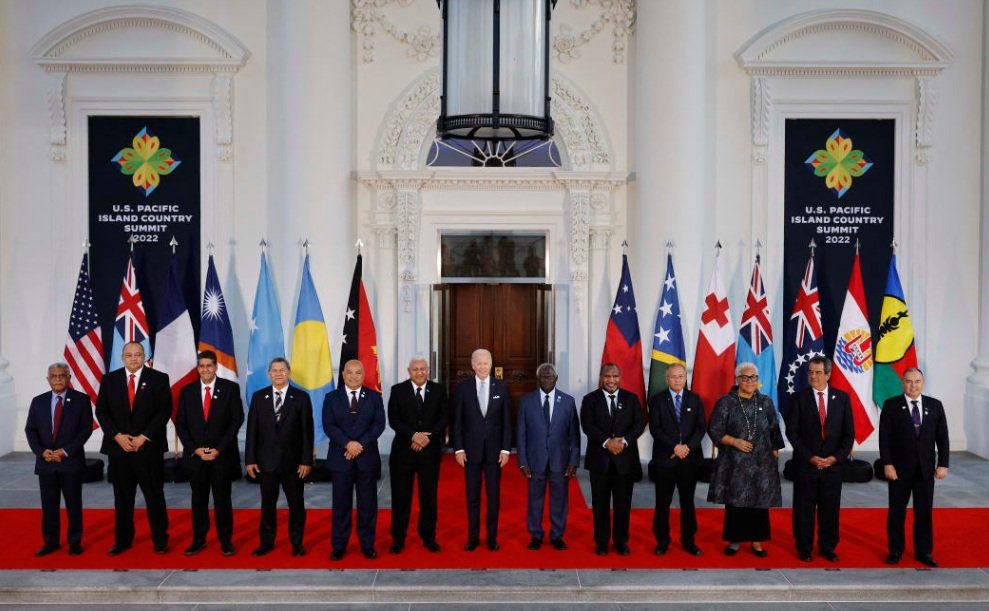By Rep Ed Case (D-Hawaii)
Successive administrations and congresses over two decades have moved to direct our foreign policy focus to the broad Indo-Pacific, from the U.S West Coast to the East Coast of Africa, Arctic to Antarctic.
The increasing clarity and pace of the People’s Republic of China’s intentions, capabilities and actions throughout the region have sharpened our efforts.
But our focus must include the entirety of the Indo-Pacific, in particular the Pacific Islands where much of the present and future of the region and world are being charted.
These islands spread across Melanesia, Micronesia and Polynesia, from Hawai‘i and Rapa Nui (Easter Island) to Palau and New Caledonia, covering a vast expanse of the Pacific Ocean. They include fourteen independent nations (three in free association with the U.S and two with New Zealand), and multiple other jurisdictions including, for our country, Hawai‘i, Guam, the Northern Marianas, American Samoa and the Pacific Remote Islands. Their collective land and maritime zones are larger than the land areas of China and Russia combined.
The peoples of these islands have evolved their own proud history, culture and identity over millennia, and for centuries have shared historical, cultural, economic and strategic ties with America. Tens of thousands of U.S and allied service members died throughout the Pacific Islands in World War Two defending our shared common values.
We also share many challenges of our times, though they affect the islands far more acutely. There, climate change is an existential threat, as rising sea levels subsume communities and warming oceans and overfishing destroy lifeblood marine resources. Their economies are fragile, basic services tenuous, and infrastructure aging, and they increasingly occupy the frontlines of the PRC’s efforts to compel acquiescence to its goals.
On any number of fronts, the status quo will not work. We can debate the reasons, but the reality is that over these last decades, just as our engagement with the Pacific Islands should have expanded, it lagged. We need look no further than Solomon Islands, a key country with which we have historic ties but which has tilted alarmingly to the PRC, for the consequences of disengagement.
In 2019, recognising that our direction was untenable and we needed to refocus in earnest on the Pacific Islands, several likeminded colleagues and I joined in founding the bipartisan Congressional Pacific Islands Caucus. Our Caucus has four goals: (1) education, especially inside Congress; (2) demonstration of U.S commitment; (3) communication and cooperation on shared issues; and (4) development and advancement of sound public policy.
We also introduced and have advanced our signature Boosting Long-term U.S Engagement in the Pacific (BLUE Pacific) Act, which we developed in consultation with the Pacific Islands themselves and with key allies and partners including Australia, New Zealand and Japan. Rather than a top-down, what-do-we-think-they-need approach, our initiative asks the Pacific Islands themselves what they need, and then seeks to boost existing and tailor new programs to deliver on those needs, to include trade capacity, environmental change mitigation, civil society development, maritime domain awareness and enforcement and security assistance.
On a parallel track, the last two administrations have also ramped up. President Trump hosted the presidents of Palau, the Federated States of Micronesia and the Marshall Islands for a first-ever state visit, and increased senior U.S official visits to the region (responding to the Pacific Islands’ threshold request that we just show up). President Biden’s U.S-Pacific Islands Summit in Washington and resultant Strategy for Pacific Partnership built on prior versions of our BLUE Pacific Act and committed to several avenues of increased engagement. Further results have been encouraging, including advancing new embassies in countries such as Solomon Islands, Tonga, Vanuatu and Kiribati, and increasing personnel and funding for several BLUE Pacific components (to go with equally critical increases in defense engagement and other efforts to implement our National Defence Strategy).
Also highly encouraging is the growth in cohesion and common voice among the Pacific Islands themselves through multilateral entities, especially the Pacific Islands Forum headquartered in Fiji. The Forum’s recent 2050 Strategy for the Blue Pacific Continent identifies the region’s real challenges and provides a roadmap for partnership opportunities to advance mutual values and interests.
This is progress, but there is clearly unfinished business on all fronts. My Caucus Co-Chairs Aumua Amata Coleman Radewagen (R-American Samoa), Ami Bera (D-Calif.) and Brad Sherman (D-Calif.) and I joined other colleagues in recently reintroducing an updated version of our BLUE Pacific Act. H.R. 4538 re-synchronises with the Forum’s 2050 Strategy as well as our partners’ and allies’ efforts and our own advances on both the authorisation and appropriation fronts. It also builds on the Trump and Biden administrations’ efforts, to include specific codification and required periodic updates of the Strategy for Pacific Partnership.
The Pacific Islands are largely encouraged by these various efforts, but remain understandably skeptical of our long-term commitment to their home. For them, given our inconsistent history and the alternative path offered by the PRC, it remains to be seen if we mean what we say and are truly the partners they can, will and want to rely upon for their present and future.
This makes it all the more important that we fully back our commitments to the Pacific Islands and mobilize and deliver the resources necessary to follow through with consistency and dependability. Our BLUE Pacific Act offers an integral part of a long-term framework for this critical U.S. re-engagement in the Pacific Islands.
Ed Case represents the 1st District of Hawaii and co-chair of the Congressional Pacific Islands Caucus.
SOURCE: THE HILL/PACNEWS















